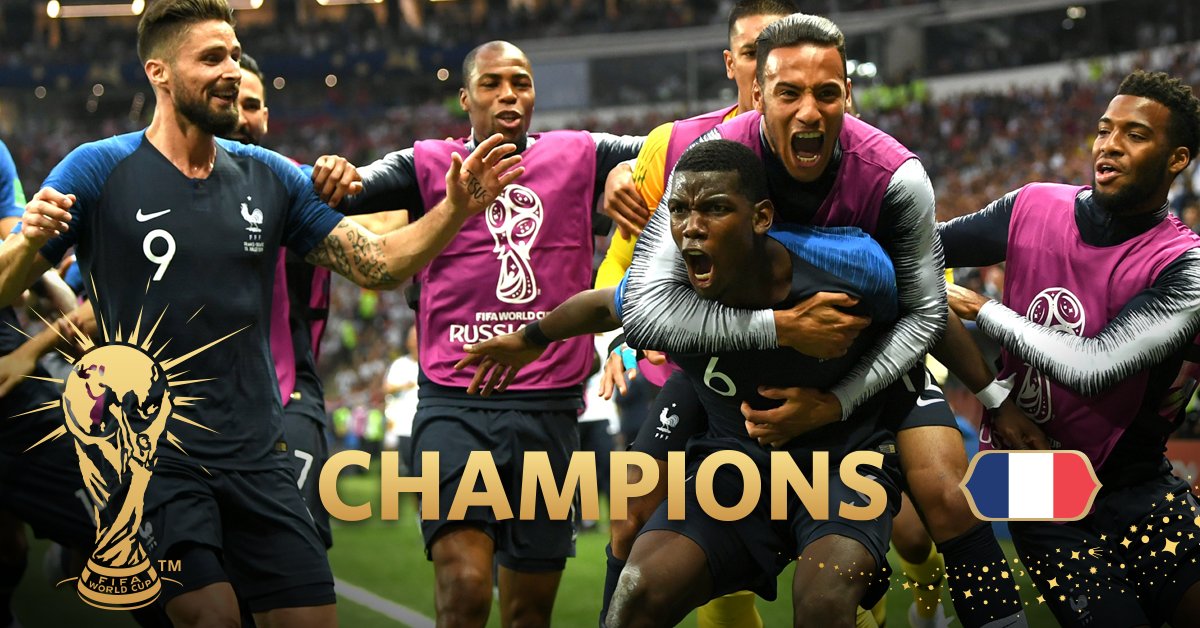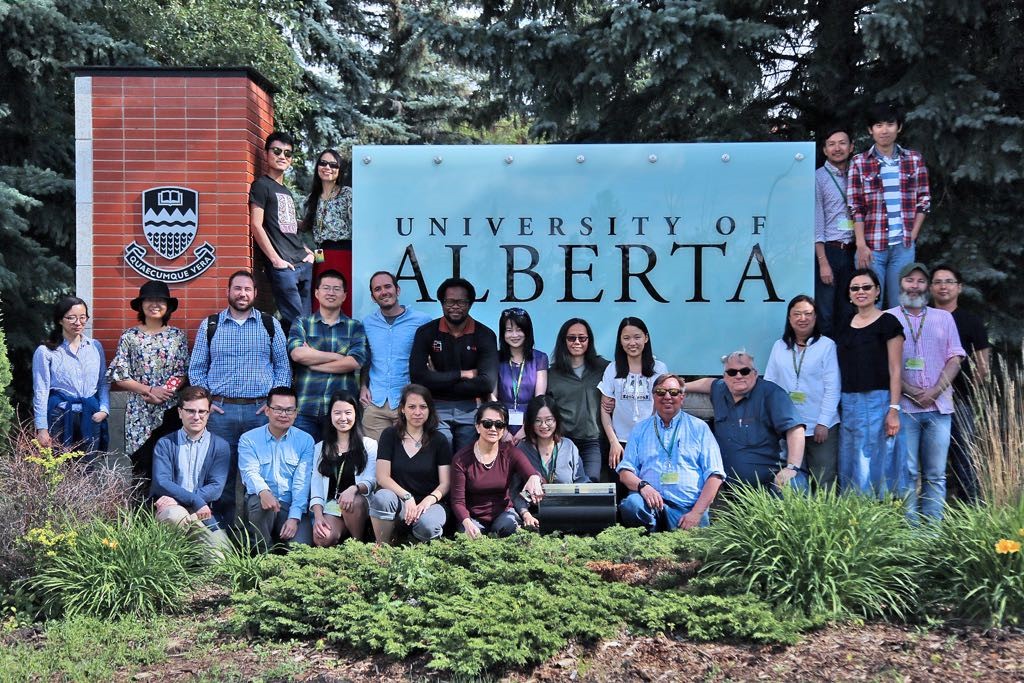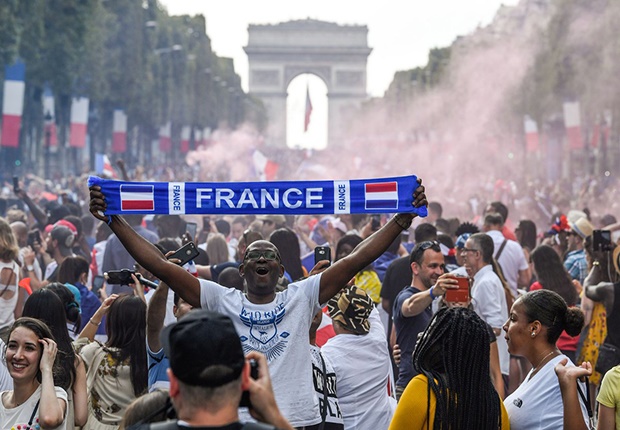Opinion: World Cup Reflections - What Defines Nationality?
This opinion piece was authored by HDR Student, Karen Sy de Jesus from the Institute for Culture and Society.
En-route to Sydney from Vancouver, after attending a Summer Institute in Alberta, the big non-political (yet still political) news I got when the plane landed, was that the French team had just won the FIFA World Cup for the second time in two decades.

Team France celebrates World Cup win (Twitter @FIFAWorldCup (opens in a new window) )
The FIFA World Cup games were very much present during my three weeks of daily lecture discussion on the Chinese Migration Realities at the Summer Institute. But what caught my attention was the feud between The Daily Show host Trevor Noah, and French Ambassador to United States of America, Gerard Araud.
The French Ambassador had written a letter of response to Mr Noah chastising (opens in a new window) him for his on air joke about the French World Cup win as being an “African victory” (opens in a new window), referring to the African roots (opens in a new window) of fourteen (opens in a new window) of the French team players. This letter itself would have been great fodder for an analysis on ethno-racial identities, but that would need another article to address.
This feud illustrates the potency of identity politics to trigger tensions that are often under girded by other factors such as historical or ideological differences. Whether we are referring to hijab/niqab ban, crime stats, property values, or immigration/citizenship policies, the who often obscures the why’s and the how’s, even if the problem at hand needs the participation of all concerned in order to find a workable solution.
This shift to individuals as the root of the problem is not new. Foucault’s Discipline and Punish (1975) and Dangerous Individual (1978), and Hall, et. al’s Policing the Crisis (1978) helped us understand how identity categories are largely produced by the interplay of institutional and discursive forces. This ascription of responsibility or accountability links the doer and the deed while eliding the web of ‘actors’ in between.
Quoting Gunyar Myrdal, Pred (2000) posited that “no person or culture can be judged solely by its imperfections”. In understanding societal problems or phenomena, Pred argued that there is a need to look into how the process of “everyday functioning and reproduction of particular cultural, economic and political institutions in time and space are continuously bound up with the temporally and the spatially specific actions, knowledge build-up and biographies of particular individuals” (1983, p. 46).
This is demonstrated by Hall, et. al’s (1978) work on mugging as a social phenomenon rather than the crisis of mugging that had snowballed into an ensuing moral panic and a justifiable heavy-handed policing regime. The figure of the ‘mugger’ is made to bear the whole process that Pred described.
It is far easier to point the finger to a figure as the emblematic source of the problem, rather than at a wider web of relations and institutions that produce such characters as the ‘delinquent’ as ‘dangerous’, the ‘mugger’ and the ‘terrorist'.
This reductionist habit that short-circuits thought and obscures productive conversations is made easier today as it aligns with, and reinforces the neoliberal shift to the individual where we can ask: “Why doesn't she just take off the hijab? Why don't they speak English? Why don’t they find work? Why don’t they just stay where they are?”.
In examining the production of ‘Chineseness’ in the 21st century ascendance of the People’s Republic of China, I look into how the economic is entangled with the cultural and the political, therefore creating a new social dynamic, particularly in societies with a significant number of Chinese-identified individuals.
The creeping global Sino-phobia (opens in a new window) is an example of how individuals - whether alone, or seen as part of a group, is no longer a choice - are perceived as the root of the problems we face, most of which are the result of a medley of factors such as advances in technology and mobility.
It is therefore, quite interesting to look at my colleagues at the University of Alberta Summer Institute, (organized by Professor Christopher Lupke, Department of East Asian Studies) and ask the question: “Who is Chinese?”. It might be common sense to look at our picture below and surmise who in our group might be, and who might not be, Chinese.

Yet, within our very limited group brought together by an interest in Chinese studies, there is already an array of ‘Chineseness’ that might also provoke the question: what is ‘Chineseness’? Is it the ability to speak its language/s? Is it appearance? Intimate knowledge of a region one might call home or of its cultural forms? One’s citizenship, or name? One’s ontological position or performance?
Alas, there is no one good answer. As a Chinese myself, I too, have to position myself differently daily. It depends on who I’m with; and sometimes, it does not matter. These moments of it-does-not-matter contain so much oxygen for a normative experience of belonging that transcends differences. I will venture to guess that many members of the French team must be embracing and celebrating the moment to be French.
Therefore, Ambassador Araud’s claim of the World Cup French team as “French citizens … proud of their country”, and the accusation of Mr Noah as denying them their 'Frenchness' belies the reality that to be French as an identity is both more complicated and more exacting than being born in France or having French citizenship.
This convenient ascription of 'Frenchness', which I will juxtapose with Xi Jin Ping’s call (opens in a new window) to Chinese-identified people abroad to join in the “Chinese Dream” of national rejuvenation, smacks of a political expediency that the French World Cup players, like the Overseas Chinese, might easily recognize, and respond perhaps, with more than a small degree of skepticism. A survey of the domestic politics of both France and PRC might shed more light into these moments of inclusion.
The politics of identity cannot be dismissed as political correctness or divisiveness when individuals are ascribed identity positions that have real impact on their lives. Places like Chinatowns across the globe and the banlieues in Paris cannot be separated from the ethno-racial subjects produced and sustained in these respective spaces.
These spaces are the material aspect of the ideological construction of the ethno-racial order of the society. Whether self-described or ascribed by a dominant group or by a putative political leader, ethno-racial identities, despite their visible distinctiveness, remain polysemic in nature and can only be understood within and during the context of the claim or the ascription.
This polysemy is evident throughout the history of the Chinese individuals who left China throughout time. Like the French players at the 2018 FIFA World Cup 2018 who are celebrated today, but might be under suspicion (opens in a new window) tomorrow, overseas Chinese individuals have been variously constructed through time and spaces. Their embedded positions in society demonstrate the fluidity and provisional nature of how they are categorised.
As the broad range of topics covered during my aforementioned Summer Institute demonstrate, ‘Chineseness’ itself shifts even within the geographical space we call China, whose long recorded history also demonstrates how ‘Chineseness’ also shifts through time and shifting governance policies. Identity labels by themselves, do not inform us much about people because they shift as the societal norm shifts. But they accomplish a lot of ideological work.
Perhaps we should look into the how’s and the why’s of identity categories that are claimed or ascribed in order to better inform us as to how we might navigate a globalised world where social issues are not just about social or cultural differences.
The study of identity as a product of contemporary social phenomenon should be seen as part of the historically produced politico-affective management of anxieties as societies undergo changes. The better set of questions might be: for whom and for what purpose is the abstraction of individuals into identity categories for? What conditions of possibilities do they create? With what effects? As Ghassan Hage might ask: in what ways does this abstraction process re-distribute hope in the society?

World Cup victory celebrations, Champs Elysées, Paris (Getty Images)
For most of the members of the French football team, the cheers of the crowd as they parade down Champs Elysées is an experience to behold and to enjoy and perhaps, to hope. Today, they are the symbols of liberté, égalité, fraternité. Tomorrow or the day after… who knows?
Image credits to Getty Images, and Twitter's @FIFAWorldCup.
1 August 2018




